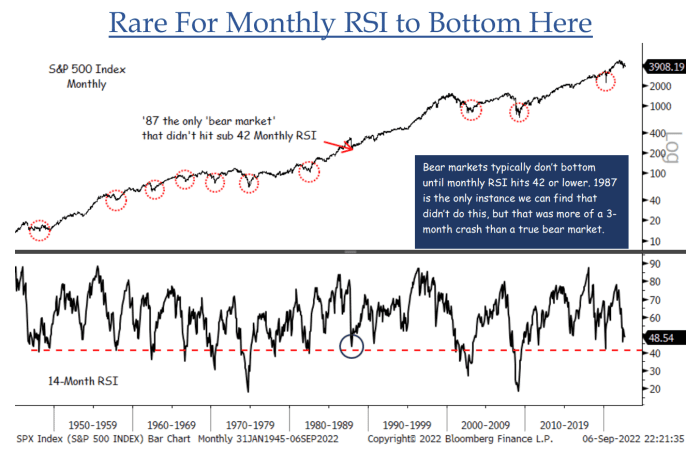This post was originally published on this site
Stock market investors may be facing another bear-market surprise, according to a technical strategy report from BTIG.
The S&P 500’s monthly relative strength index is at 48, pointing to the possibility that the U.S. stock market has not yet bottomed after its slide this year, a note from BTIG on Wednesday shows. The relative strength index, or RSI, is an indicator used in technical analysis that assesses whether stocks are oversold or overbought.
“This bear market looks to have one more surprise before it’s all over,” said Jonathan Krinsky, chief market technician at BTIG, in the note. “Bear markets typically don’t bottom until monthly RSI hits 42 or lower.”

BTIG NOTE DATED SEPT. 7 2022
There was an exception, as seen in the chart above, with 1987 being the only “bear market” that didn’t fall below a monthly RSI of 42, according to BTIG. “1987 is the only instance we can find that didn’t do this, but that was more of a 3-month crash than a true bear market,” said Krinsky.
While BTIG previously thought the S&P 500’s June low would hold after retracing 50% of its bear-market tumble, the technology-heavy Nasdaq Composite “reclaimed more than 50% of its decline in 2000 before making new lows,” according to Krinsky.
With the heavy weight of tech in the S&P 500 today, “perhaps it is acting more like the high-beta Nasdaq did 20 years ago,” said Krinsky. “Ultimately, the unrelenting upward pressure on rates and the dollar suggest this bear market likely has one more surprise, and the June lows need to be back in the conversation.”
U.S. stocks ended sharply higher Wednesday, bouncing back from Tuesday’s decline and three straight weeks of losses. The Dow Jones Industrial Average
DJIA,
finished with a gain of nearly 440 points, up 1.4%, while the S&P 500
SPX,
jumped 1.8% and the Nasdaq
COMP,
surged 2.1%. The finish left the S&P 500 up 8.5% from its June 16 closing low.
Stocks rose as investors weighed findings from the Federal Reserve’s “Beige Book,” a report on the U.S. economy released Wednesday afternoon that showed the outlook over the next year remained “generally weak” due to rising interest rates as well as labor and supply shortages.
Investors were also considering comments made by Fed Vice Chair Lael Brainard, who said in a speech Wednesday at the conference hosted by The Clearing House and Bank Policy Institute that “monetary policy will need to be restrictive for some time to provide confidence that inflation is moving down to target.”
Stock-index futures were largely flat early Thursday ahead of remarks by Fed Chair Jerome Powell.
As for the recent decline in stocks, “the market is short-term oversold but everyone knows it,” said Krinsky. “When an oversold market can’t bounce, it’s typically a sign to step aside and wait for a bigger washout.”

